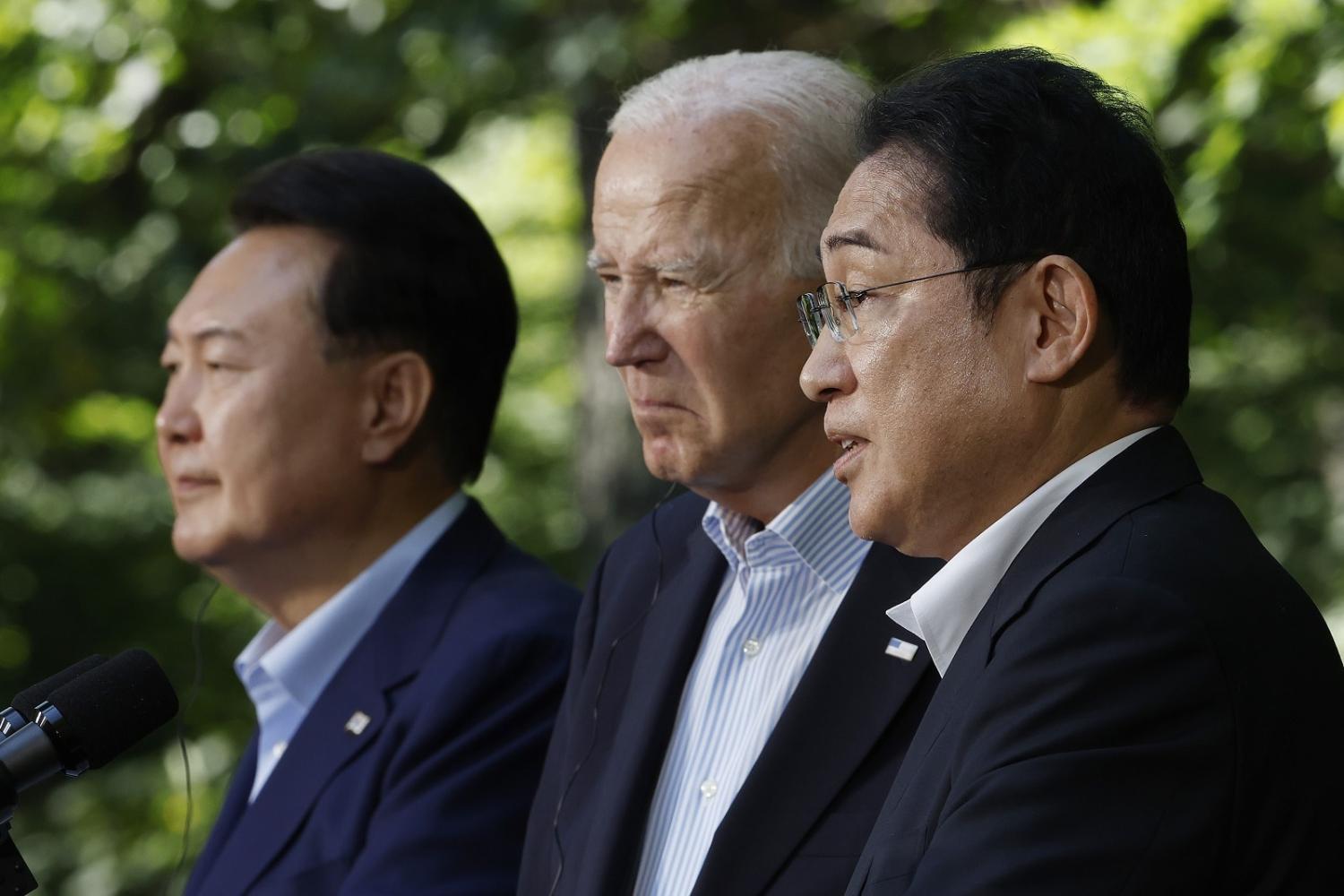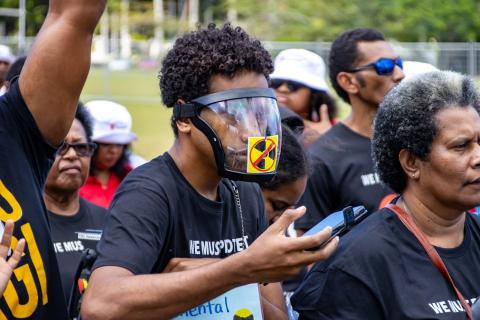On 18 August at Camp David, Japan, the United States and South Korea optimistically hailed “a new era of trilateral partnership”. Korean domestic politics and the vexed history of Korea–Japan relations leaves considerable reason to doubt the trilateral partnership’s staying power. Equally however, structural changes to the regional security environment mean that simply “tearing up” the pact will not be easy.
First, the details. Building on the momentum generated by South Korean President Yoon Suk Yeol’s indefatigable push towards a “future-orientated” relationship with Japan, the new trilateral partnership established 20 distinct initiatives and dialogues. Some of the most notable include annual leader and key minister summits, as well as a commitment to consult on regional security matters and share missile data in real time.
While North Korea is the primary target of the security cooperation, mentions of Taiwan and the South China Sea suggest China as another focus. Certainly, this has been the interpretation in Beijing.
Despite the appearance of progress, evidence abounds that the trilateral partnership’s edifice is built on shaky ground. In 2018, Japan–Korea relations were sent into freefall by the real possibility that Seoul would enforce court orders to seize and sell some of Nippon Steel’s local assets to compensate victims of forced labour during Japanese occupation in the Second World War.
To stabilise bilateral ties and pave the way for trilateral cooperation, Yoon pushed through a “solution” early this year. Under the agreement, Korean companies will compensate victims, while Japanese companies will contribute to a “future partnership fund”.

Tokyo rebuffed Yoon’s initial proposal to have Japanese companies pay into a joint compensatory fund, sticking to the argument that all historical issues were resolved by the 1965 Treaty normalising diplomatic relations.
Korea’s opposition leader Lee Jae-myung was quick to castigate the agreement as the country’s “biggest humiliation”. Just days after Camp David, while not addressing the pact directly, Lee fulminated that Japan’s release of treated water from the Fukushima nuclear plant was equivalent to a “Second Pacific War”.
Lee’s bombastic rhetoric is red meat for a political base who believe Japan has not adequately atoned for past atrocities. In a hyper-partisan political environment, Lee’s comments also reflect a bitter contest for the soul of Korean nationalism. In basic form, this struggle is about whether South Korea’s creation story should be defined more by anti-Japanese resistance or anti-communism.
Yoon is an unpopular president who probably went further to appease Japan than many on his own side expected. It is entirely possible that the next president from the Korean left – possibly coming as early as 2027 – will abrogate Yoon’s forced labour agreement and withdraw from the trilateral pact. This would be nothing new. Ostensibly “final and irreversible” agreements on historical matters reached in 1998 and in 2015 on “comfort women” were later reversed.
How future progressive Korean governments decide to act will not occur in a geopolitical vacuum. On this score, there could be grounds for pragmatism, as there has been in the past. Seoul’s traditional strategy of using conventional force to deter North Korean provocations is steadily eroding, particularly as Pyongyang develops tactical nuclear weapons. Both Russia and China have reasons of their own to be much more accommodative of Pyongyang. Recently, proposals were even tabled for trilateral naval drills.
The delta between Beijing and Seoul on managing the North Korean threat was forcibly illustrated by China’s retaliation against South Korea’s deployment of the Terminal High Altitude Area Defence missile defence system in 2017. The once genuine hopes that China would meaningfully restrain Pyongyang look positively Panglossian in current circumstances. Indeed, Beijing may be re-appraising its view of North Korea, now seeing the Hermit Kingdom as more of a geopolitical asset than irritant.
Meanwhile, the Korean public’s perceptions of China – including as a security threat – have shifted dramatically to be some of the most negative globally.
Then there is the matter of Sino–US relations, which are in a far more precarious position than 2018 – the year former president Moon Jae-in withdrew from the “comfort women” agreement. Even if Seoul might dissemble on the matter, Washington clearly views the trilateral pact as a crucial component of the region’s minilateral architecture for checking China, its “pacing threat”. With its dense web of initiatives, the trilateral partnership is designed to institutionalise cooperation and preclude a swift exit.
The upshot is that exiting the trilateral pact could be a tortuous and bruising process, with the potential to seriously jeopardise the health of the Korea–US alliance.
This alone does not guarantee the pact’s endurance. Seasoned observers of Korean politics have noted how, absent a powerful bureaucracy or bipartisan foreign policy tradition, individual presidents have huge discretion to shape foreign policy.
This is a dangerous dynamic for the United States. Viewing cooperation with Japan as domestically unpalatable and with previously fringe ideas such as nuclear-armed autonomy becoming more mainstream, a future Korean president could conceivably be willing to repudiate the Camp David agreement, come what may. Another relevant dynamic here is the growing fear of being drawn into any Taiwan conflict.
The United States will ultimately be hoping that power moderates, and that the enduring benefits of the alliance prove persuasive.

